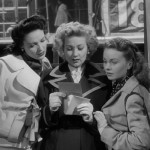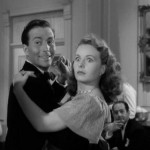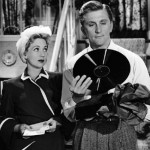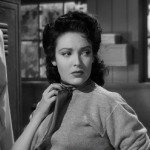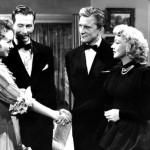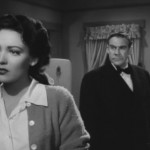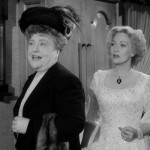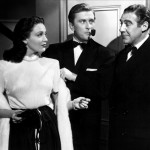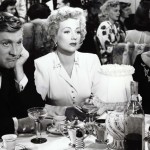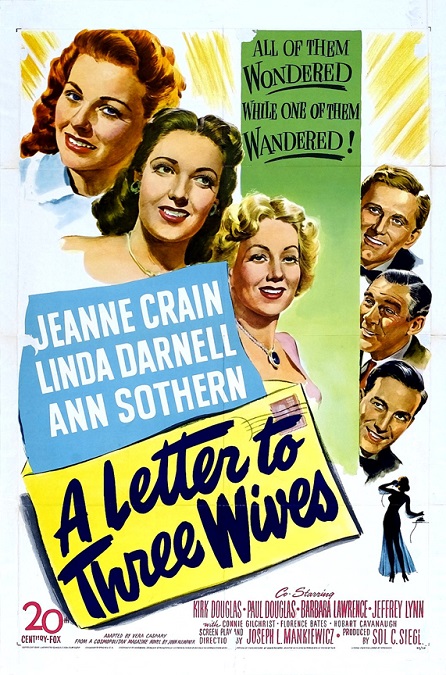
A Letter to Three Wives – 1949
This movie was a good, and well written drama, but there seemed to be a subtle element to the plot may have touched the supernatural, just a little bit. I know, that is a strange thing to say about an Academy Award nominated film from the 1949, but to me, it is undeniable. I’ll explain.
The film was about three women, their husbands, and one mysterious woman who’s face is never shown on the screen. The film starts out with a woman doing a voice-over as we watch the plot being set up. She speaks in narration, introducing the three wives as they prepare to go on a trip together to volunteer at a picnic for underprivileged children. She talks in a first-person, omniscient dialogue, implying that she know them each personally and intimately.
Right there, my suspicion was aroused. The only time you ever hear that particular kind of narration is when it is a dead character talking about the events that led to their death.
The three wives were Deborah, Rita, and Lora Mae, played by Jeanne Crane, Ann Sothern, and Linda Darnell, respectively. Their husbands, Brad, George, and Porter were played by Jeffrey Lynn, Kirk Douglas, and Paul Douglas, again, respectively. As the women are going to the picnic, they each discuss, with bitterness, a woman named Addie Ross. She seems to be more beautiful, smarter, more thoughtful, and more familiar with the three husbands than the wives are comfortable with.
Before boarding the boat, they are handed a letter that is addressed to all three of them. It is from Addie, saying that she has run away with one of their husbands. The three women do their best to ignore the letter and dismiss it as a joke in poor taste. The film that follows is made up of the flashbacks of the three women as they reflect on their marriages, each afraid that she is the unlucky woman.
It actually is a very cleverly written script for which Vera Caspary and Joseph Menkiewicz won the Academy Award for Best Writing, Screenplay. In each of the three flash-back sequences, we learn that each husband obviously knew and, on some level, loved Addie, letting the audience know that it could be any one of them. It also established that each marriage had its problems, just to keep the audience guessing even more.
The one-day picnic trip ends and the three women nervously return to their homes in the early afternoon. Rita is first and finds George waiting for her. She seems to fall in love with him all over again. Lora Mae, who seems to have the rockiest marriage, finds Porter at home, but in a sour mood. Their relationship does not seem to change. Finally, Deborah arrives at home and is given a telegram from Brad, saying that he will not be home that night. Her heart breaks.
But in the end, they pulled the old switcheroo. Later that evening, the three women and the two remaining husbands go to a party, and wouldn’t you know it? It turns out that it was Lora Mae’s husband, Porter, who had run away with Addie Ross. But he loved his wife too much to go through with it, despite their marital problems. If we were paying close enough attention in the beginning of the film, we would remember that Brad had told his wife that he might not be home that evening, even going so far as to explain why. Apparently he was telling the truth.
I also learned that there were some significant differences from the original novel, Letter to Five Wives, aside from two women being cut. Wikipedia summed it up pretty well, so paraphrase their article. “All the major characters differ substantially between the novel and film. In the novel, Lora Mae is less a gold digger, and more a woman who has always been dominated by her wealthy husband; Rita is trying to succeed in a second marriage with a man she has never felt passionate about; and Deborah is a plain and quiet ex-spinster whose “catch” of a husband has been disappointed in her lack of success in society. As for the other two wives, Martha and her husband locked horns over child-rearing issues, while Geraldine was devoting excessive time and money to her singing career with few results.” Interesting…
And finally, I have to return to the film’s parting kicker, which cemented, in my mind, that for whatever reason, Addie Ross was dead. As the friends, whose marriages have all been strengthened by the events of the day, leave the table, a champagne glass mysteriously tips over and breaks. Addie’s first-person voice-over returns, and she cryptically says, “Hi-ho. Goodnight Everybody.” So, was the tipping champagne glass proof that she was a ghost, or was it just a red herring? Watch the film, and decide for yourself.
